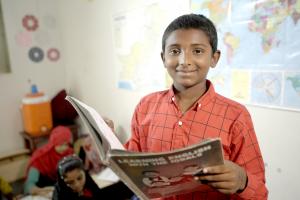One man’s dream opens doors to education access across the world
Now, Mr Badar has opened 15 schools across Pakistan and Tanzania and is in discussions to expand into India, Bangladesh, Sri Lanka, Malaysia, Indonesia, Philippines, Pacific Islands, Kenya, and Ghana – all before even completing his PhD.
About 32 per cent of children in Pakistan – more than 20 million individuals – are not enrolled in school according to the 2017 Pakistan Social and Living Standards Measurement Survey.
Mr Badar’s research attributed the number of out-of-school children to four factors: cost of infrastructure, availability of teachers in remote and regional communities, attitudes of parents, and effective monitoring.
Equipped with this knowledge, he established the EDvantage Digital Learning System (EDLS) in 2019 to offer a unique learning model called a digitally operated one-room schoolhouse (DOORS).
Mr Badar found one-room schoolhouses – a concept that already existed in some areas of Pakistan – were an economic and scalable option that allowed children of all ages to attend class and learn basic subjects such as maths, local languages, and English from a community member.
But using technology to introduce online learning meant teachers from across the world could overcome the tyranny of distance to teach specialist subjects to eager students.
“We created a very simple and cost-effective model for the local facilitator and students with just one laptop, one monitor, and one camera and other digital accessories per class,” Mr Badar said.
“Through the online classes, we try to match the education content any Australian student would receive, and it’s that centralisation that makes our system unique.
“It's not just functional literacy, or primary school programme, it is much advanced than that and the school day can be catered to meet the needs of any community.”
However, families’ reliance on young children’s employment was one of the biggest enrolment barriers the project faced.
For example, a boy who was interested in attending school also worked in a shoe factory, bringing home his family’s only source of income.
“We went to the boy’s employer and explained the benefits of allowing him to attend school, and worked with them to adapt his schedule,” Mr Badar said.
“Now, that boy studies in the morning and from there he goes to the shoe shop in the afternoons.
“These are the kinds of adjustments we need so that education is accessible to the children while acknowledging the community’s unique needs.”
DOORS include one local facilitator and administrator, which encourages the community to engage with the schoolhouses as opposed to relying on “outsiders” travelling to remote communities.
“This project is founded in my PhD research but has become so much more than that,” he said.
Mr Badar’s research contributes to Goal 4 of the United Nations Sustainable Development Goals, which relates to quality education.
Sierra Haigh
Charles Darwin University
media|cdu.edu.au| |media|cdu.edu.au
Visit us on social media:
Facebook
X
LinkedIn
Instagram
YouTube
Other
Legal Disclaimer:
EIN Presswire provides this news content "as is" without warranty of any kind. We do not accept any responsibility or liability for the accuracy, content, images, videos, licenses, completeness, legality, or reliability of the information contained in this article. If you have any complaints or copyright issues related to this article, kindly contact the author above.
Made In The USA Announces Top ARTIST Awards, and an Evening TAG Art Auction next weekend
NewSky Security Expands into Cyber Security Private Investigations to Combat Sophisticated Botnet and VPN Threats
CTO G. Vimal Kumar of Cyber Privilege Honored for Advancing Cyber Forensics and Digital Evidence in India
Kalendarium
Więcej ważnych informacji
 Jedynka Newserii
Jedynka Newserii

 Jedynka Newserii
Jedynka Newserii

Prawo

KE proponuje nowy Fundusz Konkurencyjności. Ma pobudzić inwestycje w strategiczne dla Europy technologie
W środę 16 lipca Komisja Europejska przedstawiła projekt budżetu na lata 2028–2034. Jedna z propozycji zakłada utworzenie Europejskiego Funduszu Konkurencyjności o wartości ponad 400 mld euro, który ma pobudzić inwestycje w technologie strategiczne dla jednolitego rynku. Wśród wspieranych obszarów znalazła się obronność i przestrzeń kosmiczna. Na ten cel ma trafić ponad 130 mld euro, pięciokrotnie więcej niż do tej pory.
Firma
Były prezes PGE: OZE potrzebuje wsparcia magazynów energii. To temat traktowany po macoszemu

Choć udział odnawialnych źródeł energii w miksie energetycznym Polski jest stosunkowo wysoki i rośnie, to ten przyrost jest chaotyczny i nierównomiernie rozłożony miedzy technologiami – wskazuje Forum Energii. Dodatkowo OZE potrzebują wsparcia magazynów energii, a zdaniem Wojciecha Dąbrowskiego, prezesa Fundacji SET, ten temat jest traktowany po macoszemu. Brak magazynów powoduje, że produkcja energii z OZE jest tymczasowo wyłączana, co oznacza marnowanie potencjału tych źródeł.
Infrastruktura
Wzrost wynagrodzeń ekip budowlanych najmocniej wpływa na koszty budowy domu. Zainteresowanie inwestorów mimo to nieznacznie wzrasta

Budowa metra kwadratowego domu w Polsce kosztuje od 5,55 do 6 tys. zł w zależności od województwa – wynika z najnowszych analiz firmy Sekocenbud. Najdrożej jest w Warszawie, gdzie cena za metr kwadratowy domu przekroczyła już 6,2 tys. zł. Na przyrosty kosztów budowy domu wpływają zarówno drożejące materiały budowlane, jak i wyższe wynagrodzenia pracowników. Inwestorzy nie rezygnują jednak z budowy domów jednorodzinnych, co ma związek m.in. z wciąż wysokimi cenami mieszkań czy też obniżką stóp procentowych.
Partner serwisu
Szkolenia

Akademia Newserii
Akademia Newserii to projekt, w ramach którego najlepsi polscy dziennikarze biznesowi, giełdowi oraz lifestylowi, a także szkoleniowcy z wieloletnim doświadczeniem dzielą się swoją wiedzą nt. pracy z mediami.









.gif)

 |
| |
| |
|